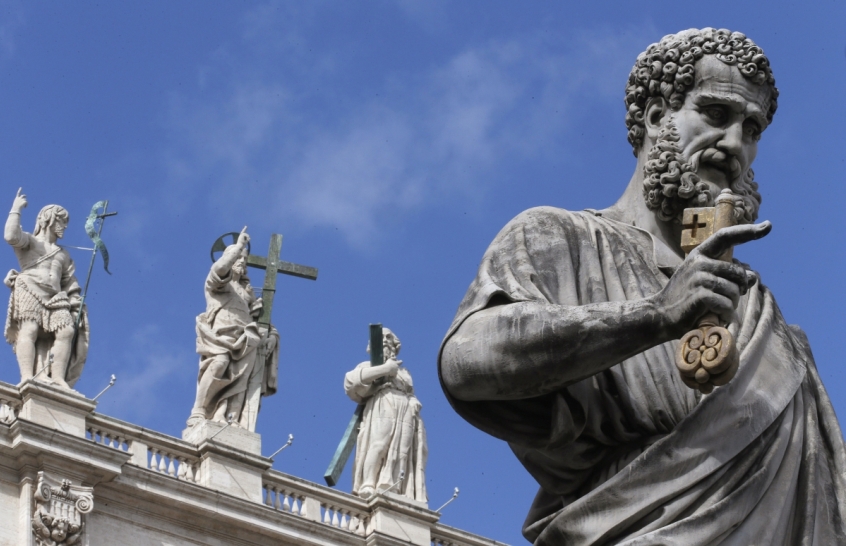
Today marks the Catholic feast day of the dedication of the Churches of Saints Peter and Paul. St Peter's basilica, named after the disciple Jesus called the 'Rock' of his Church, is probably the most famous Church building in Christendom. The iconic structure, first built in AD 319, and reconstructed over the centuries, stands today at the heart of the Vatican City, Rome.
The apostle Paul's basilica is St Paul's Outside-the-Walls, which stands near the Abaazia delle Tre Fontane, where Saint Paul is believed to have been beheaded.
Today marks the dedication of both these buildings, just as 29 June celebrates the feast days of both the apostles themselves in the Roman Catholic Church. The two men stand twinned together in Church history, dual but diverse icons of the Church and how it began.
Church father St Augustine of Hippo wrote in a sermon in AD 395: "Both apostles share the same feast day, for these two were one; and even though they suffered on different days, they were as one. Peter went first, and Paul followed. And so we celebrate this day made holy for us by the apostles' blood. Let us embrace what they believed, their life, their labors, their sufferings, their preaching, and their confession of faith."
So as we celebrate these men, what can we learn from a glimpse of their lives? In many ways, they seem to stand apart form one another. Peter dominates the gospel stories, and Paul, who converts to Christianity much later, dominates the rest of the New Testament with his prolific letter writing. Peter was called to be the 'rock' of the Church while Paul was commissioned to take the message of Jesus to the gentiles. In the few accounts we have of their interactions, they don't get on very well. In fact, perhaps today is the day to reflect on how two men, both flawed yet passionate followers of Jesus, learned to disagree well and together follow God's call on their lives.
Flawed men, used by God
Peter was no great scholar of the Jewish law, nor an impassioned zealot with the fire of John the Baptist. He was just a humble fisherman. Not only that, but he would go on to constantly misunderstand Jesus' teaching, and in Christ's greatest hour of need, would deny him three times. Peter had been chosen to be Jesus' 'rock', yet showed himself to be not only volatile and unstable, but deeply unfaithful too. Nonetheless, Jesus restores Peter (John 21) and continues to use him in his work, with Peter stepping out boldly in the book of Acts.
Likewise, in Paul, formerly Saul, Jesus had a man who had made his name as a persecutor of Christians, someone who vehemently opposed the Church and what it stood for. Some of his stridency carried on into his new life, and his letters weren't always the most charming or polite. Yet, despite a dark past and a perhaps abrasive personality, God would use Paul for a key commission: to take the message of the gospel to the Gentiles, bring the message of Jesus from the Jewish people to the entire world.
In Peter and Paul we see a theme that is emphasised all across Scripture: that God uses broken people to bring about his redemption and restoration. What we also see in the Bible, is what happens when those people disagree. This is most clearly seen in Galatians 2. Here Paul explains how he had to confront Peter (Cephas) face-to-face:
"When Cephas came to Antioch, I opposed him to his face, because he stood condemned. For before certain men came from James, he used to eat with the Gentiles. But when they arrived, he began to draw back and separate himself from the Gentiles because he was afraid of those who belonged to the circumcision group. The other Jews joined him in his hypocrisy, so that by their hypocrisy even Barnabas was led astray."
Paul has to confront Peter, because Peter is contradicting the gospel. The message of Jesus was not simply restoration for Israel, but rather for the whole world. Being one of God's people was now marked not by circumcision, but by being "In the Messiah", a follower of Jesus. Peter however, intimidated by others who insist that one must still be circumcised, is drawing away from the uncircumcised Gentiles. He is drawing a divide where God has intended to bring peace and unity.
Paul doesn't let this issue slide, because Peter's actions stand against the commission that God had given to Paul, to bring salvation to the Gentiles.
Here we see an example of Christian leaders modelling good disagreement. Sometimes there are times where one can 'agree to disagree' (Paul and Barnabas go their separate ways in Acts 15:36-41), but in Galatians we see an example where the truth of the Gospel is at stake, and so confrontation is necessary.
In one of his own letters, Peter mentions Paul: "So then, dear friends, since you are looking forward to this, make every effort to be found spotless, blameless and at peace with him. Bear in mind that our Lord's patience means salvation, just as our dear brother Paul also wrote you with the wisdom that God gave him. He writes the same way in all his letters, speaking in them of these matters. His letters contain some things that are hard to understand..." (2 Peter 3:14-16)
It's easy to empathise with Peter when he says of Paul that "His letters contain some things that are hard to understand...". We see a glimpse here of how these two gifted men didn't always agree, or even understand each other. Yet we also see a more mature Peter, who now commends Paul as a teacher and 'dear brother' to his readers, even humbly recognising that he can't always understand his teaching. It would be easy to ignore him, or to highlight his faults, or parade Peter's own successes, but he does none of that here.
Human beings disagree all the time, and that isn't any less true for Christians. Sometimes we disagree badly, and we get personal and unkind, which is not right. At other times there may be times when disagreement matters, because important truths are at stake. But even this can still be done lovingly, with the emphasis on restoration, not condemnation. Peter and Paul weren't in contest to see who was better. They were both flawed, and yet both called, for different purposes in different times. 2000 years later, they still have a lot to teach us.













